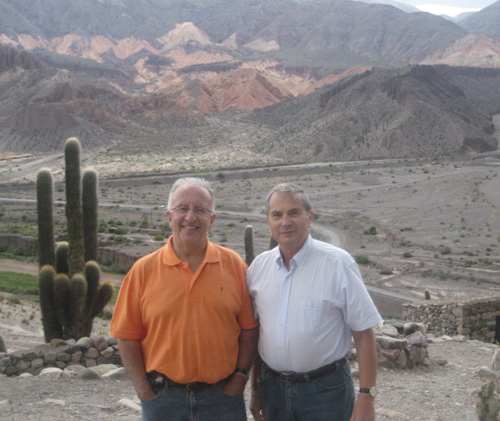
It was the dull abruptness of it all. I was walking along the shores of Newport Harbor, with friends, on a fine Thanksgiving afternoon, when the cell phone rang and we got the news from Maria Piccone. Then there was the immediate call to Rome, to the number under his very name. Elena Aga Rossi, in tears, told me it happened in the morning, while walking with a friend, a thrombosis hitting like a bolt from nowhere, and sending him to the big nowhere.
So little to say—and absolutely nothing to do.
John Updike’s “Requiem” came to mind:
For life’s a shabby subterfuge,
And death is real, and dark, and huge.
The shock of it will register
Nowhere but where it will occur.
Updike was prepared. Victor wasn’t. We were not.
It took time to crawl out, in pain, from the torpor of disbelief.
Instant communication, again—the blessing and the bane of our age. I sent an email message right there, from the Blackberry, to Volker Meja in Frankfurt (who already knew and was ready to take a plane), something like this: “Victor is gone. Our little family is smaller today. Nothing more to say except to thank you, while I breathe, for the opportunity you gave me to become his friend.”
Then the long memories arrived, and started a flood. Thirty years of friendship, debates, agreements and disagreements, deep mutual curiosity, and always trust. I only now realize how large a part Victor occupies in my life.
Back in the late 70s, in Newfoundland, two exiles met, from Argentina and the USSR; rivers of fresh blood in one and the crust of clotted wounds in the other. The discussions went on well into the nights.
He came from a galaxy I could only imagine from afar. He was expelled by the Soviets for using his own mind. As he said with irony, it was nothing spectacular, but dangerous enough for the regime. And he brought with him a treasure trove of knowledge about his land—not just the USSR and Soviet-type societies, but an older Russia too. Not just Stalin’s terror (as a child, Victor had to help his father burn a correspondence with Trotsky in the fireplace) or his own “neo-Stalinist state,” there were also Mandelstam, Ahmatova, Vassily Grossman, and further back, Pushkin and Gogol to talk about. Literature and its theorists: Vladimir Propp, Jurij Lotman, and Victor’s own short stories published by Sellerio in Sicily, where he had met Leonardo Sciascia. We talked about Victorio Codovilla, the long-lived faithful head of the Argentine Communist Party—a minor version of Palmiro Togliatti, whom Victor, together with Elena Aga Rossi, would later debunk.
There are snippets from those conversations that are still fresh in my mind, things like the incredible story of Molotov’s wife, imprisoned by Stalin in a concentration camp while her husband kept his job as foreign minister, and then, when Khrushchev’s thaw arrived and she was released, the husband met her at the train station with a bunch of flowers, to resume their life together. “Do you have such perversions in the West?” Victor asked me. I couldn’t think of one, not even from McCarthy’s scoundrel times.
For Victor is hailed, in Italy (which finally became his home), as the great demystifier of communism. And that he was. A Russian in exile, naturalized Canadian, he died Italian, as one of Italy’s most brilliant intellectuals. His was a long career: from mining engineer in Siberia, to curator of icons at the Hermitage, to independent sociologist in the early years of Brezhnev, to an intellectual exile in campuses all over: the United States, Canada, Italy.
Victor was prolific. He had deep knowledge of the Soviet archives; he was a political commentator, a frequent contributor to Telos, the soul behind another journal, Ventunesimo secolo, and the author of several books and countless monographs on the history and social structure of the Soviet Union. He recently gained popular notoriety for his masterful study of “class cleansing” in the massacre of Katyn. His exposure of the dealings of Italian communists with their Kremlin “brothers” (really masters) debunked the myth of a truly independent party in Italy. His books on Togliatti, on the Italian left and Stalinism, and on the evolution of the Soviet regime are indispensable to understand a big chunk of the twentieth century.
As an intellectual, he was big. For me he was Victor, my friend: we traveled together from the Canadian Maritimes to the Apennines, from the Andes to Mexico City. I was happy to show him my native Buenos Aires, and regret we could not visit St. Petersburg, his native Leningrad, as well. We hunted mushrooms together, we cooked together (once a goose basted with vodka; another time a braised hen with walnut sauce, which he claimed was Stalin’s recipe from Georgia), we walked together the streets of Paris and of Rome, the gardens of Amelia, and the walls of Lucca, where we also taught together a seminar or two. We formed part of the Newfoundland gang of social-science friends, and of the wider network of Telos, around the energy vortex of Paul Piccone.
So there is something I propose we do, now that my friend is dead, to defy the numbing, damning grief: we should celebrate a life so fruitful and so full.



